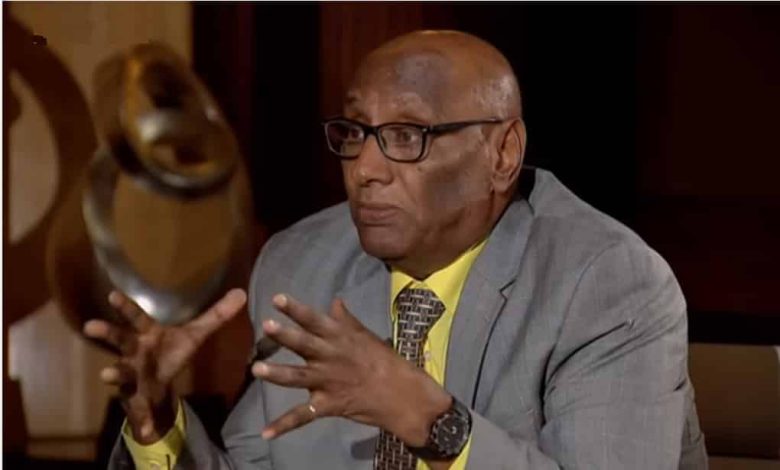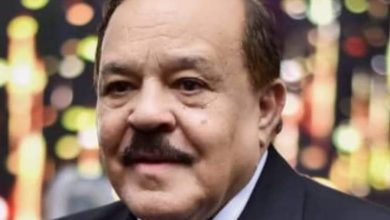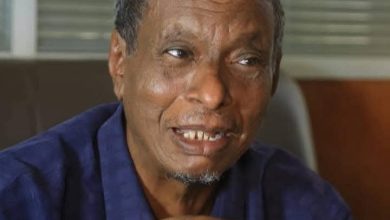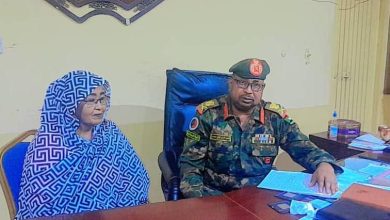Interviews
Sudanese Thinker and Politician Abdullah Ali Ibrahim: Hemedti Wanted to Defeat the Revolution Before It Defeated Him, and Talking About the 1956 State is Nonsense

Interview by: Mohammed Al-Aqra
The war in Sudan continues relentlessly between the army and the Rapid Support Forces (RSF). Despite over a year and a half of fighting, the prospects for a resolution remain distant, with rising civilian casualties and unprecedented waves of displacement. Political positions among civilian forces remain fragmented, while ethnic and regional polarization escalates. Al-Quds Al-Arabi conducted an interview with Professor Abdullah Ibrahim, a thinker, historian, politician, and university professor, about the war, the related narratives, and proposed solutions. Below is the text of the interview.
More than 500 days have passed since the start of the war in Sudan, and the fighting, killing, and displacement continue, with no political solution in sight. How do you see the situation, and where is the country heading?
Simply put, politics ended with the war, and war has now become politics by other means. If this war is seen as “futile” by the Democratic Civil Forces and as “cursed” and “vengeful” against their overthrown regime by the Islamists, how can we find a political solution when we refuse to address the politics that ignited it?
Abdullah Ali Ibrahim declared his alignment with the army from the start of the war, to preserve the state. Some say that the army itself is responsible for destabilizing the state by creating and arming the RSF. Isn’t your stance contradictory to the historic role of the military institution?
I don’t know a more misguided statement in this war than the widespread notion that “the RSF was born from the womb of the army.” First, the RSF was never an organic part of the armed forces, as the army distanced itself from it, even when using it in the war against rebel movements. The RSF emerged from the National Salvation regime, which the Sudanese overthrew, having spawned an unspeakable ugliness, including the RSF. Personally, I wish the army had not merely refused institutional engagement with the RSF during the Salvation era but had firmly defended its monopoly on arms. However, it was an army suppressed by a regime that sought to protect itself against its adversaries, even if it meant sidelining the military itself. And let’s suppose the RSF did emerge from the army’s womb—Sudanese people would say in this case, “The disciple has overpowered his master,” akin to the proverb that says the magic has turned on the magician. Alright, show us what you can do with this rogue disciple, or else it’s just a pointless piece of history.
The RSF adopts a narrative of fighting the “1956 State” that emerged after the departure of British colonizers, blaming it for the country’s destruction and backwardness, while also claiming to pursue democracy and the goals of the December Revolution. In your opinion, how credible is this narrative in light of Sudan’s current situation and the nature of the crisis?
What the RSF says about the 1956 State is nonsense—just “hot air,” as we say in Sudan. I don’t know of any entity as guilty of heinous crimes, including the eradication of certain groups, that is more associated with the Salvation State, of which the RSF was a hired gun. The RSF’s rhetoric is nothing more than scavenging leftovers from the old margin-center debate that dates back to the 1980s. It was movements like “Taqaddum” (Progress) that masterfully employed that rhetoric, both sincerely and deceitfully, in opposition to the Salvation regime. Whoever believes the RSF’s rhetoric about the 1956 State is buying a bridge—an absurd and long-standing deception, in my view.
There are widespread claims that regional projects are fueling the war, aiming to cause demographic change and resettle Arab diaspora communities in Africa. What’s your take on this discourse?
The idea that this war is part of a foreign conspiracy to resettle the Arab diaspora from the African coast is promoted by some affiliates of the Salvation regime. Yet, I don’t know of any regime that resettled these Arabs from Chad like the Salvation regime did, and previous regimes before it also did the same. The Hawatya, Salamat, and Misseriya of Chad settled both before and after the Salvation regime. Even Hamidti’s tribe, the Mahariya, are from the Arab tribes of the African coast, who came early to Sudan. The Salvation regime employed these Arabs in its campaigns against the rebel movements at the cheapest possible price.
The real disaster lies in how land traditions in Sudan were violated to allocate land to these people, despite their lack of entitlement to it. Every so-called “tribal conflict” during the Salvation era stemmed from locals protesting the occupation of their lands by these Arabs from Chad. Even Sudanese Arabs, like the Bani Hilba and the Ta’aisha, suffered from the Salvation regime’s land violations in favor of these African coast Arabs. No group has endured horrors like the Masalit, who were targeted by the coastal Arabs from the day they arrived. So, behind the so-called “Arab diaspora,” if that term applies, lies an ecology, economy, and politics we chose to ignore, until they took control of the land and chaos ensued.
In the Sudanese war, we’re witnessing an increase in polarization and counter-polarization rooted in ethnic narratives—Arab diaspora, Nile Valley, river versus sea, Jellaba, the “blacks” of Darfur, and more. Does this indicate that the war stems more from social tensions than a mere power struggle involving internal forces supported by regional actors seeking to exploit resources?
As long as war is politics by other means, it’s no surprise that this war has escalated the tensions that fueled the rhetoric of both armed and unarmed opposition groups during the Salvation regime. The idea of storming Khartoum to end the “rule of the Jaaliyeen, Shaigiyya, and Danagla” of the 1956 State has long been a dream of the armed movements in Darfur, who rallied behind slogans like “Khartoum, we’re coming in.” They envisioned replacing its residents with people they deemed more deserving. If you read the “Black Book,” which outlines their grievances over lack of representation in power, it’s clear that these feelings of resentment towards these groups have been festering for years.
I don’t want to repeat the Salvation regime’s role in inflaming ethnic hostilities through its alliances with certain Arab groups, both local and from the diaspora, in its war against its African rivals. This war has rekindled old historical grudges, such as those dating back to the Mahdist State in the late 19th century, in which the Arab tribes from the cattle-raising regions, now described as RSF supporters, played a prominent role. War is a cesspool of grievances, most of which have been carefully cultivated by both government and opposition forces alike.
There are concerns that the current war might lead to the division of Sudan, and some international and political forces have begun to suggest the possibility of dealing with a dual power situation and territorial divisions. Hemedti has also repeatedly threatened to form a government in the cities and regions he controls. Could we see another secession, similar to what happened in South Sudan?
The talk of Sudan’s division is inspired by Libya, which historically consisted of two states until 1923. However, Sudan has never been divided in such a way since it unified within its current borders, with regions like Darfur only joining the fold later but eventually integrating into the state. Even if we were to hypothetically entertain the idea of Sudan’s division, could anyone convince Hemedti, who wants control over the entire country? Moreover, he has agreed with the “Taqaddum” movement on a program for a civilian and democratic Sudan after the war. The notion of Sudan’s division is one of the fantasies of international envoys who see all developing nations as the same case, causing unnecessary alarm.
What’s your take on the army’s insistence on the implementation of the Jeddah Declaration commitments, including the evacuation of civilian homes and public properties, before engaging in any new negotiations?
I think it’s a basic principle of negotiation. What’s the point of negotiating if its outcomes are ignored and disregarded?
There are decision-making centers within the army tied to Islamist factions that prevent any settlement that doesn’t guarantee their return to the political equation. What’s your comment on that?
I’ve yet to hear anything that convinces me that Islamists hold significant influence within the armed forces. This is merely a suspicion cast on the army and propaganda. And how do those claiming that Islamists won’t return to the political arena know for sure unless they have dedicated themselves to ensuring their exclusion from any future arrangements in Sudan? The Islamists, in this context, resemble a saw that keeps cutting whether it moves forward or backward. They claim they won’t allow Islamists back into politics, while at the same time accusing them of igniting the war to forcibly return to power. It’s like believing your own exaggerations about their desire to return to power, a belief stoked by your own efforts to prevent their participation in both governance and politics.
This reminds me of the story of the mischievous boy who lied to the children about a banquet in the neighborhood to get rid of them, only to believe his own lie and chase after the children to join the fictitious feast.
Frankly, if I were asked, I would say that the sensible people of Sudan should ensure that the Forces of Freedom and Change never return to power—they’ve failed and become addicted to failure.
Has the war ended the December Revolution and its goals and dreams? Are Sudanese people headed toward a governance structure that contradicts what they fought for years ago and struggled to achieve through peaceful means?
This war emerged from the revolution. The Islamists don’t want to acknowledge this fact because they refuse to come to terms with the suffering their regime caused, which ultimately led to the creation of a malignant entity like the RSF. They don’t even mention their alliance with the RSF during the transitional government, which was designed to sabotage its efforts. On the other hand, “Taqaddum” doesn’t want to acknowledge the war’s roots in the revolution because doing so would expose their failures in managing the transitional period. This war wasn’t intended to destroy the December Revolution; rather, it aims to dismantle the modern Sudanese state that previous revolutions have tried to preserve. Can you imagine that the revolution’s slogan, “Disband the Janjaweed, no militia should rule the state,” was lost on the RSF? Hemedti saw the writing on the wall, as the saying goes, and he wanted to defeat the revolution before it could defeat him.
Do you think a military victory is possible in this war, either for the army or the RSF?
This is a question better directed to the armed forces. What troubles me most about this war is the blurring of boundaries. Conversations about military matters have become as casual as gossip at a funeral.
How do you evaluate the roles of the other political forces, the allies of Burhan, and the position of the Communist Party and its allies from the Resistance Committees regarding the current war in Sudan?
The largest and most evident bloc among Burhan’s allies is the Islamists. However, I don’t think they’re supporting the army’s cause in the war as effectively as they could. When you read their statements, it seems they’re waging a war within a war against the Forces of Freedom and Change, which has now become “Taqaddum” in one form or another. Their real war isn’t against the RSF but against the revolution that toppled their regime. They haven’t yet reconciled with their mistake in the state, which led to the creation of the RSF. Instead of acknowledging this fatal mistake, they’re busy comparing the RSF’s size during their rule to its bloated size after the revolution. I haven’t seen any grassroots mobilization from them. You don’t hear of directives to their Islamist doctors to assist here or there, nor do they play any role in grassroots diplomacy in countries that influence the course of the war. I haven’t even heard of them initiating any fundraising campaign from their own platform to support the “Sufi lodges” that others have launched in the neighborhoods. While they have established some media platforms, which is a positive step, they still fail to recognize the dangers of their alliance with the army. It’s no wonder someone like Tom Perriello accused them of prolonging the war and twisting the army’s arm at the negotiating table. I wish they’d be more cautious of such accusations, as they may one day find themselves labeled “terrorists,” and then we won’t know where to hide.
As for the Communists, they’ve lost their way ever since they distanced themselves from negotiations between the revolution and the military. They understood the pitfalls of these negotiations but refused to engage in a way that would help the revolution’s broad coalition navigate them. They used their exclusion from the transitional government to target it at every turn, ultimately calling for its downfall, which came at the hands of others, not theirs. There were more astute forces than them, and now they’re left issuing angry, insipid statements. One of their recent statements called on the masses to stop the war and specifically urged the “labor front” to take on this task, even though such a body hasn’t existed for years. There aren’t even unions anymore due to the war, with factories shut down and the role of the worker effectively abolished.



